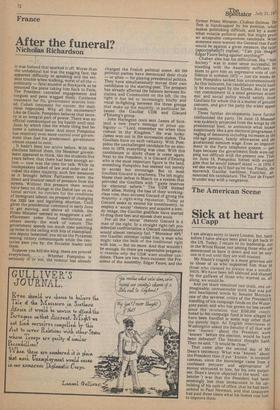France
After the funeral?
Nicholas Richardson
It was Iceland that sparked it off. Worse than the unhabitual hat was the sagging face, the apparent difficulty in speaking and the evident trouble when walking, worst of all the — politically — fatal stumble at Reykjavik as he mounted the plane taking him back to Paris. The President cancelled engagements and tongues and pens wagged freely. Cortisone treatment for flu, government sources hinted. Cobalt treatment for cancer, the malicious responded. Why all the excitement? Like de Gaulle, Pompidou believes that secrecy is an integral part of power. There was no official communique on his health until midJune, by which time the whole thing had become a national issue. And since Pompidou has relatively even more control over government than had his predecessor, government almost ceased to exist.
_ It hadn't been too active before. With the elections behind them, the Messmer government appeared to think, like the students five years before, that there had been enough action — now was the time for talk. While its loudspeakers talked of law and order and invoked the silent majority, such few measures as it brought before Parliament were the direct and ironical result of pressure from the streets. Without this pressure there would have been no change in the Debre law on national service, no concern for the conditions of immigrant labour, no prospect of changing the 1920 law and legalising abortion. Until given the presidential command in early June to get moving, and above all visible, the Prime Minister seemed to exaggerate a selfeffacement some found meritorious and others merely the work of nature. The government spends too much time patching up holes in the ceiling with bits of elastoplast, one deputy lamented: you sit on the Pyramids issuing victory communiqués while the centuries pass you by, the Socialist leader told them.
Suppose you kill the king, there are princes everywhere. . . . Whether Pompidou is seriously ill or not, the rumour has already
changed the French political scene. All the political parties have denounced their rivals — or allies — for playing presidential politics. They have simultaneously moved their own candidates to the starting-post. The prospect has already affected the balance between Socialists and Communists on the left. On the right it has led to increasingly bitchy and vocal in-fighting between the three groups that make up-the majority, in particular between the 'Gaullist UDR and Giscard d'Estaing's group.
John Harington once sent James of Scotland a new year's message of pious ambiguity — "Lord, remember me when thou comest in thy Kingdom." He was lucky: James won out in the succession stakes. The Gaullists have no such certainty. With Pompidou the unchallenged candidate for an election in 1976, everything was clear. With this candidature in doubt chaos is come again. Next to the President, it is Giscard d'Estaing who is the most important figure in the land, something Pompidou has seemed not merely to accept but encourage. But to most Gaullists Giscard is anathema. The left might blame their defeat in March on a system that provided the Gaullists with "game reserves for electoral safaris." The UDR blamed their allies. Noting the loss of their workingclass vote, they accused Giscard of giving the majority a right-wing reputation. Today as Giscard seeks to extend his constituency, to employ a ' social ' rhetoric and acquire a trendy image, the Gaullist godiltots have started to drag their feet and squeak their souls.
For all the 'social' rhetoric Giscard is a man of the right. In a straight right-left presidential confrontation a Giscard candidature would almost certainly fail. " Monsieur 49%': one Gaullist minister called him, a man who might take the bulk of the traditional right with him — but no more. And that wouldn't be enough. So there are respectable pragmatic reasons why the UDR want another can-' didate. There are two front-runners: the President of the Assembly, Edgar Faure, and the former Prime Minister, Chaban-Delmas. The first is handicapped by his position, whia makes politicking difficult, and by a smile' what volatile political past, but might prove an acceptable compromise candidate. wheo someone once warned the General that Faure would be against a given measure, the latter (apocryphally?) replied, "Can you imagine Edgar Faure being against anything?"
Chaban also has his difficulties. His " No4 Society" was in some sense successful, his standing with the Assembly sufficient for them to give him an impressive vote of confidence in summer 1972 — just six weeks be' fore Pompidou sacked him unceremoniouslY As this indicates, his candidature would hardly be encouraged by the Elysee. But his proyen commitment to a more generous economic and social policy would satisfy those Gaullists for whom this is a matter of genuine concern, and give the party the wider appeal it needs.
Three further developments have further confounded the party. On June 15 Messmer was suddenly projected from the wings by the presidential boot, to announce what looked suspiciously like a pre-electoral programme, ragbag of measures including increases in the old-age pension, family allowances and the guaranteed mimium wage. Even an improvement in the Paris telephone system — perhaps because the government finds wire-tali' ping too difficult with the present one. Then on June 19, Pompidou hinted with evident glee that he would himself stand — in 1976.11 est des morts qu'il [out qu'on tue. Finally, the maverick Gaullist hardliner, Foulchet, afl nounced his candidature. The Tour de France is under way with a vengeance.






























 Previous page
Previous page